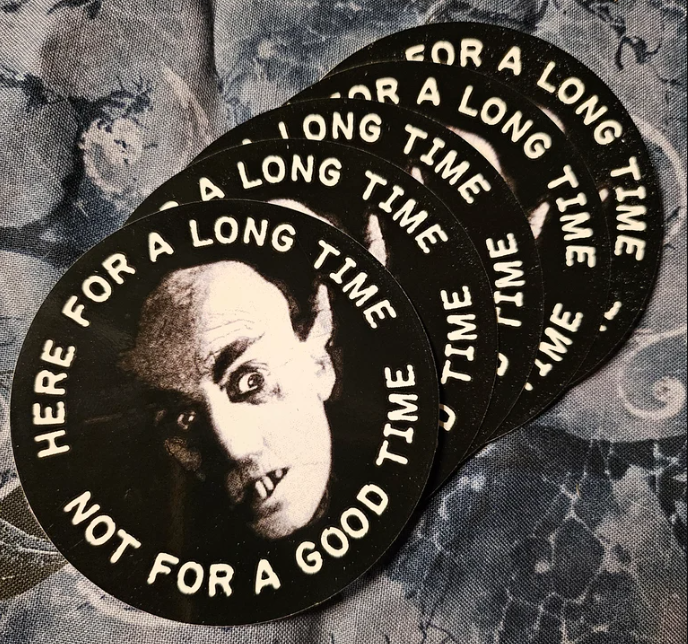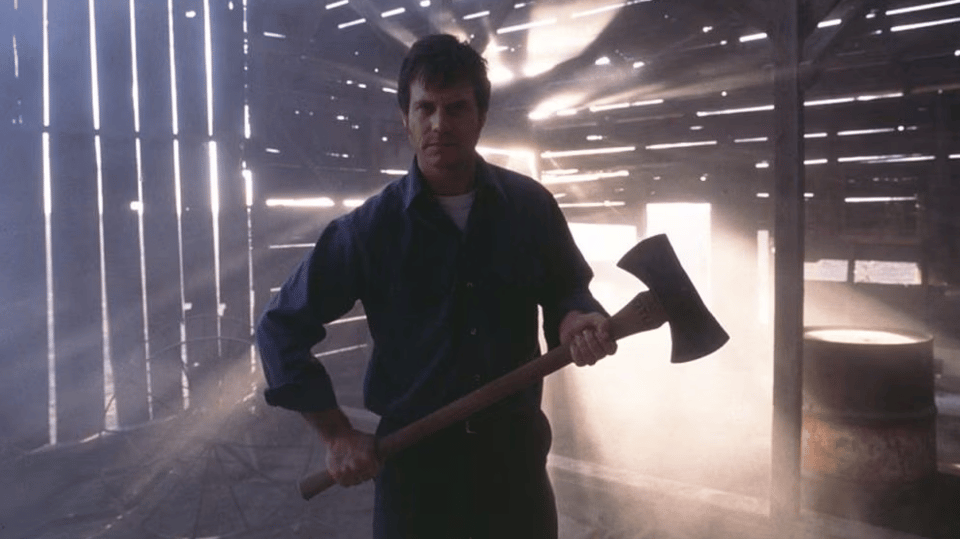Manifestos, mantras, and horrors both real and imagined.

It's April!
Hope you got to see the eclipse. Here's what's going on.
On The Docket

No-Tell Motel is nearly done! All art has been finished, which just leaves a few pages to sew up in layout. I expect backers will have download codes for their PDFs before the month ends, and printing will begin shortly after that. It looks so good, y'all.
By popular demand, I've opened a VOID 1680 AM Discord for all current and aspiring DJs as well as fans of the program. It's chill! Come on in and talk music, dig into the lore of your favorite Affiliates, brainstorm game hacks, or just hang out with like-minded folks in a low-key place. We'd love to have you.

Stuff to stick on other stuff! The Nosferatu stickers are back in stock! Grab one, grab five, go nuts. Who cares. We're all gonna die some day.
Just a friendly reminder that you lovely subscribers get 20% off absolutely everything at my shop forever and ever amen with promo code NEWSLETTER. Enjoy!
On My Mind
Every single episode of Dice Exploder is worth your time, but right now I'm thinking about the "Innovation in Game Design" episode. It helped solidify my thoughts on games like Blades in the Dark as a sort of paving of desire paths - someone seeing a collection of wants and then uniting and defining them for wider use. I may be shifting to a place where Blades is more useful to me as a signpost than a game to play, and this is helping me come to terms with that.
But, mostly, the episode stuck with me because I didn't agree with a lot of it! Part of this is I simply don't trust the word "manifesto" as it is commonly deployed in arts scenes; that is, it's less about usefully identifying coherent movements in art (yours or others') and more about being seen to identify them so you can claim credit for it later. I have a pet theory that much of the internet saw "Manic Pixie Dream Girl" escape containment and wanted to get some of that heat, and now social media has slowly driven itself insane as a result. It's Scene Behavior, in other words, and I had enough of that in comics. No thank you.
That said, how "manifesto" is used in this episode is (sometimes) interchangeable with "personal statement," which I can get behind. I'm a big fan of relentless self-interrogation and highly recommend it to anyone. It was the foundation of my brief time as a movie critic: whatever emotional response you have to a work is valid, just commit to finding out why you reacted the way you did. All that's fine. But when you start attaching words with an aura of self-conscious Cool about them, as "manifesto" most certainly is, I get suspicious of the motives.
And, more broadly speaking, I don't think it's the creator's job to set and define the taxonomy of creation; that's for other people to do. And that may sound flippant, but I mean it sincerely: there is no better personal statement than just making the work and being true to your sensibilities as you do so. If someone else can make some sense of that, great, but leave them to it and get on with things. ("Get on with things" may be as close as I get to a personal creative mantra.)
My go-to example for this thinking is film noir, which was not defined by its practitioners but by French critics largely after that scene petered out (or, if you prefer, mutated into something else). I think that level of cultural, chronological and geographic remove is potentially necessary to get any kind of handle on what scenes are doing and why.
I also think chasing novelty-for-the-sake-of-it in design is a fruitless endeavor. My baseline advice here: Care about things other than the medium you're working in.
A personal anecdote about that. I was a journalist for a short while, and part of my education on that front was to spend two weeks shadowing different writers and editors at a city newspaper. I spent a pretty harrowing day with the city desk editor, and something he said has stuck with me through the decades: if he has two otherwise equal potential hires and one of them has a journalism degree and one of them has a degree in anything else, he's going to take the latter every time. He wanted people who knew about things other than journalism. You can teach AP style to any writer willing to listen, but you can't teach that spark of curiosity.
If there's one unifying theme to these thoughts, it's that I have both fear and distrust of behaviors and tendencies that could lead to calcifying feedback loops of same feeding on same. If all you do is "games in, games out," your games (or whatever) are going to become increasingly anemic, and no amount of mechanics swiped from board games can right that ship.
Short version: broaden your input and the novelty will follow, because you are the novelty.
For Your Consideration
Here's some stuff I've been into lately.
This interview with Atticus Ross and Trent Reznor is typically interesting, and one topic comes up multiple times: Reznor learning to find peace and joy in personal works changing once they left his hands. His POV on "Hurt" in many ways becoming Johnny Cash's song, and his journey with that, is worth hearing. Listen to that bit (and the part on "Head Like A Hole") if you're pressed for time.
Really liked Towards a Theory of Protestant Horror, how it profiles "Catholic" horror and contrasts it. In short: Catholic horror posits a (super)natural order to the cosmos that is more or less understandable, and wherein redemptive sacrifice may save you. Protestant Horror is much more like Job: we suffer at the whims of a capricious and possibly absent God, and grace only exists when said entity decides to grant it. The VVitch is cited as a good modern example (with reasons as to why), and I'd also like to submit Frailty for consideration.

Frailty. RIP, Bill Paxton. If you read the above and think "gosh, that sounds a bit like folk horror, but that tends to be very British" then good news: Searching for the American Folk Horror Zine: An Investigation is for you. Does what it says on the tin, and defines its terms up front, which I always appreciate.
It's a pleasure to browse Sean T. Collins's photo essay of "monumental horror-images," which interpolates images culled from a wide variety of horror movies and television with an essay on why they're so haunting. I like the wordplay on "monumental" here, too.
Okay, now for real-life horror. Daniel Bessner's "The Life and Death of Hollywood" details a writer's-eye-view of just how bad things are getting for creative folk in the filmed entertainment world, and gives a broad survey of how we got to this point with names, dates, and average salaries adjusted for inflation. Add it to the storied annals of "things Reagan made infinitely worse," but Clinton played his part, too. Get my guard down and ask me about the Telecommunications Act of 1996 sometime if you want to see some pyrotechnics.
Now for something nicer, if a little bittersweet. Scout Tafoya's obituary of storied character actor M. Emmett Walsh is a beautiful piece of work and a testament to just how much an actor can do with one scene. And for God's sake, go watch Blood Simple post-haste.
I've fallen back in love with Tom Petty, as I do once or twice a year. His Full Moon Fever tour is the first concert I ever saw, and I'd recommend that album to just about anyone. You can't really miss with Wildflowers either. "Love is a Long Road" is an absolute jam, and "It's Good To Be King" gets me every damn time.
That's it.
See you next time.
